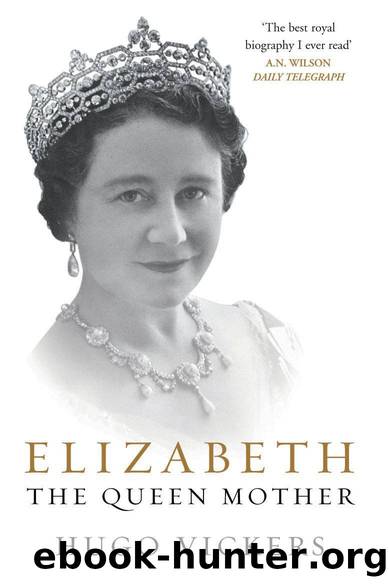Elizabeth, the Queen Mother by Hugo Vickers

Author:Hugo Vickers [Vickers, Hugo]
Language: eng
Format: epub
Tags: Autobiography, Biography, Great Britain, History, Royalty
ISBN: 9781448150724
Google: aTvKUukyrRoC
Amazon: 0099476622
Publisher: Arrow
Published: 2006-06-05T23:00:00+00:00
24
The New Elizabethan Era
‘Life is immensely dull without him’ – the Queen Mother
THE DEATH OF the King effectively ended the political life of Queen Elizabeth, forcing her into a kind of retirement. She had sustained the King for many years, and latterly she had borne the burdens of Head of State, leading the nation when he was ill. Though his death was not completely unexpected, it was nevertheless a deep shock. The King and Queen had been looking forward to a period of recuperation in South Africa in March, with none of the demands of the 1947 tour.
Now everything changed. The new Queen, Elizabeth II, ‘in the great and lonely station to which she has been called’,1 was the person to whom everyone turned. There was no defined role for Queen Elizabeth, a widow at only fifty-one. Her skill was to create a new role for herself.
There had never been a working Queen Mother before. Queen Alexandra, elegant, beautiful and deaf, had restricted her widowhood years to occasional appearances, notably her Alexandra Rose drives.fn1 Though the popular belief is that she retreated permanently to Sandringham, she was frequently in London, living at Marlborough House. Queen Mary had played a more prominent role, especially in the early years of the reign of George VI when her presence forged a direct link between George V and his second son. She represented the stability that had been briefly threatened by the trauma of the reign of Edward VIII.
While Queen Mary was again a respected and much-loved figure, her later engagements were relatively limited. Neither Queen Alexandra nor Queen Mary ever played any part in the constitutional aspects of the next reign. They were never Counsellors of State in widowhood.
Queen Elizabeth did not seek to be a political influence. She would never occupy the kind of role that Queen Frederika of Greece played in the reign of her son King Constantine in the 1960s. She now retired from the political fray. Like many a widow, she found that she had the chance to do as she pleased, and not to have to subjugate her personal interests and tastes to those of her husband. She had done her bit, especially in the war, and she had earned her repose in her widowhood. When she recovered from the shock of the King’s death, she created a very pleasing new existence.
However, this was no instant transformation. Queen Elizabeth minded greatly the loss of her power base as wife of the King. At first she found it hard to accept her daughter in her new role. As with many difficult figures who needed support, the loss of the King was acutely felt. She and the King had spent almost every day of their married life together, only being separated on the rare occasions when he visited troops overseas or she spent a few days with her father at Glamis. She missed him, and now she could see only his good qualities, and let slip the occasionally difficult times, the gnashes, the tensions and the frustrations.
Download
This site does not store any files on its server. We only index and link to content provided by other sites. Please contact the content providers to delete copyright contents if any and email us, we'll remove relevant links or contents immediately.
Waking Up in Heaven: A True Story of Brokenness, Heaven, and Life Again by McVea Crystal & Tresniowski Alex(37005)
Empire of the Sikhs by Patwant Singh(22174)
We're Going to Need More Wine by Gabrielle Union(18075)
Hans Sturm: A Soldier's Odyssey on the Eastern Front by Gordon Williamson(16664)
Leonardo da Vinci by Walter Isaacson(11907)
The Radium Girls by Kate Moore(10910)
Educated by Tara Westover(7065)
Tools of Titans by Timothy Ferriss(6952)
How to Be a Bawse: A Guide to Conquering Life by Lilly Singh(6695)
The Last Black Unicorn by Tiffany Haddish(5076)
Permanent Record by Edward Snowden(5000)
The Rise and Fall of Senator Joe McCarthy by James Cross Giblin(4848)
Promise Me, Dad by Joe Biden(4451)
The Wind in My Hair by Masih Alinejad(4426)
The Crown by Robert Lacey(4108)
A Higher Loyalty: Truth, Lies, and Leadership by James Comey(4034)
The Iron Duke by The Iron Duke(3641)
Joan of Arc by Mary Gordon(3260)
How to be Champion: My Autobiography by Sarah Millican(3189)
